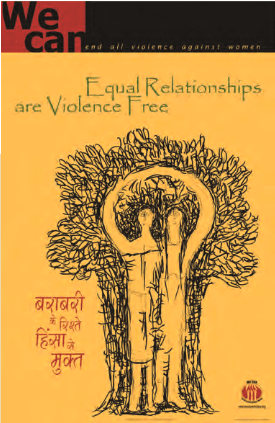NCERT Solutions for Class 8 Civics Chapter 4 - Understanding Laws
In-Text Questions Solved
Page No. 45
Q.1. State one reason why you think the Sedition Act of 1870 was arbitrary? In what ways does the Sedition Act of 1870 contradict the rule of law?
Ans.
- The Sedition act of 1870, stated that any person protesting or criticizing the British Government would be arrested without trial.
- The people were not allowed to express themselves, they were not allowed to form groups and discuss, the press was not allowed to write against the government’s decision. Hence the Sedition Act was arbitrary.
- The Rule of Law states that any rule must be applicable to everyone, however as per the Sedition Act of 1870, only the Indians would be arrested without the trial while it was not applicable to the Britishers. Hence the Act contradicted the Rule of Law.
Page No. 48
Q.1. What do you understand by “domestic violence”? List the two rights that the new law helped achieve for women who are survivors of violence.
Ans.
- Domestic violence refers to the injury or harm or threat of injury or harm caused by an adult male, usually the husband, against his wife. Injury may be caused by physically beating up the woman or by emotionally abusing her. Emotional abuse of the woman includes verbal, sexual and economic abuse.
- The two rights the new law helped achieve for women who are survivors of violence:
(i) The new law recognises the right of women to live in a shared household. Women can get a protection order against any further violence.
(ii) Women can get monetary relief to meet their expenses including medical costs.
Q.2. Can you list one process that was used to make more people aware of the need for this law?
Ans. There are many processes that are using in the presently for awaking the society. Women based groups especially by protesting and agitation highlights this with the help of media and newspapers.
Q.3. From the storyboard given, can you list two different ways in which people lobbied Parliament?
Ans. Two ways in which people lobbied Parliament:
(i) Debating: They convinced the Parliament that there is a need to give the temporary custody of children.
(ii) Submission of demand: They tried to persuade the Parliament by suggesting them to change the definition of domestic violence.
Q.4. Observe the following poster carefully. What do you understand by the phrase ‘Equal Relationships are Violence Free’?
 Ans. Equal relationship means both husband and wife enjoy equal rights in the family. Neither of them should suppress the other. Such relationships are always violence-free because both husband and wife care for one another.
Ans. Equal relationship means both husband and wife enjoy equal rights in the family. Neither of them should suppress the other. Such relationships are always violence-free because both husband and wife care for one another.
Page No.50
Q.1. Read the newspapers/watch news on TV for a week and find out if there are any unpopular laws that people in India or around the world are currently protesting.
Ans. Recently, the Supreme Court declared certain residential as well as commercial areas as unauthorized. The government officials started the work of sealing and demolishing unauthorised buildings. It left the people jobless as well as homeless. People were compelled to leave Delhi. This law was widely protested by the people. Demonstrations took place, people gathered in front of MCD offices and even ransacked them.
Q.2. List the three forms of protest that you see in the photos given below
Ans.
- Hunger strike (Top picture of left side)
- Ralley or Dharna (Lower picture of left side)
- Arrest Movement (Jail Bharo Andolan) (Right side picture) Exercises
NCERT Textbook Questions Solved [Exercises]
Q.1. Write in your own words what you understand by the term the ‘rule of law’. In your response include a fictitious or real example of a violation of the rule of law.Ans. The term the ‘rule of law’ means that all laws apply equally to all citizens and no one is above the law, not even the President of India. The law cannot discriminate between person on the basis of their religion, caste or gender. Any crime or violation of law has a specific punishment as well as a process through which the guilt of the person has to be established.
Example of violation of the rule of law:
- Diving a two-wheeler in a helmet is a law. But we find people often violating this law.
- Bribing an official is a crime. But it has become a practice nowadays. It is a complete violation of law.
Q.2. State two reasons why historians refute the claim that the British introduced the rule of law in India.
Ans. Historians refute the claim that the British introduced the rule of law in India on several grounds, two of which are given below:
(i) The colonial rule was arbitrary. The British passed the Sedition Act in 1870. Under this Act any person protesting or criticising the British government could be arrested without trial.
(ii) The Indian nationalists played a prominent role in development of the legal sphere in British India.
Q.3. Re-read the storyboard on how a new law on domestic violence got passed. Describe in your own words the different ways in which women’s groups worked to make this happen.
Ans.
- When complaints by the victims of domestic violence increased, the need for a new law began to be felt.
- Different forums raised the issue of domestic violence.
- Lawyer Collective, a group of lawyers, law students and activists, after nation-wide consultations, took the lead in drafting the Domestic Violence (Prevention and Protection) Bill. This draft was widely circulated.
- The Bill was introduced in the Parliament in 2002.
- The Bill was opposed by the women’s group.
- A press conference was held in which a decision to start on-line petition was taken.
- Several women’s organisations, National Commission for Women mad e su b mission s to th e Parliamentary Standing Committee.
- In Dec 2002 the Parliamentary Standing Committee submitted its recommendations to the Rajya Sabha and these were also tabled in the Lok Sabha.
- The Committee’s report accepted most of the demands of the women’s group.
- Finally, a new bill was introduced in the Parliament.
- After being passed in both the Houses of the Parliament, it was sent to the President for his consent.
- The Protection of Women from Domestic Violence Act came into effect in 2006.
Q.4. Write in your own words what you understand by the following sentences. They also began fighting for greater equality and wanted to change the idea of law from a set of rules that they were forced to obey, to law as including ideas of justice.
Ans.
- The Indian nationalists were fed up with the arbitrary use of authority by the British.
- They wanted to uproot it in order to bring equality.
- They made efforts to establish the rule of law by eliminating the colonial laws which were in no way justified.
FAQs on NCERT Solutions for Class 8 Civics Chapter 4 - Understanding Laws
| 1. What is the importance of laws in a democratic country? |  |
| 2. What is the difference between civil and criminal law? |  |
| 3. What is the role of the judiciary in enforcing laws? |  |
| 4. How can citizens participate in the law-making process? |  |
| 5. What are some of the challenges that arise in enforcing laws? |  |




















